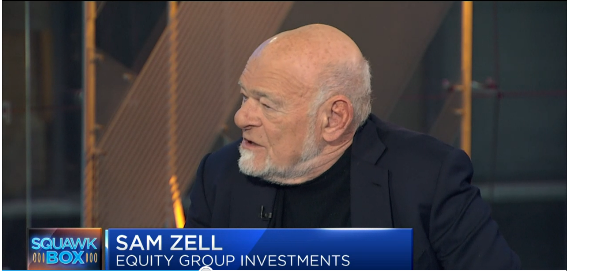Business Rebel Plays the Austrian Business Cycle (and wins)
Serial entrepreneur Sam Zell writes in his new book “Am I Being Too Subtle? Straight Talk From a Business Rebel” that he’s often asked whether entrepreneurship can be taught and he in fact funds entrepreneurship programs. He writes, “My answer is that I believe there is an inherent entrepreneurial gene, albeit it’s stronger in some than others.”
Ludwig von Mises wrote, "[Economics] also calls entrepreneurs those who are especially eager to profit from adjusting production to the expected changes in conditions, those who have more initiative, more venturesomeness, and a quicker eye than the crowd, the pushing and promoting pioneers of economic improvement."
Zell explains that entrepreneurs think differently. “It’s about how you perceive the world,” he writes. “Entrepreneurs are the ones who are always looking for opportunities to do things better. They don’t just recognize problems; they see solutions.”
Mises echos Zell’s view. "The entrepreneurial idea that carries on and brings profits is precisely that idea which did not occur to the majority...The prize goes only to those dissenters who do not let themselves be misled by the errors accepted by the multitude."
Zell writes, “And great entrepreneurs are always great salespeople.” Appropriately, Mises used the term “promoter” interchangeably with “entrepreneur.” "The driving force of the market, the element tending toward unceasing innovation and improvement, is provided by the restlessness of the promoter and his eagerness to make profits as large as possible."
Zell bought his first apartment building in 1965 during his second year of law school. From there, he has made billions in real estate and other businesses. He’s a frequent guest on CNBC, a straight shooter with a strained croak of a voice. His writing sounds like him. No braggadocio. Just the opposite in fact. He’s credited with calling the top of the real estate market by selling Equity office in early 2007. He writes, “But perfect timing is revealed only in hindsight.” He sold because, “I had simply received a Godfather offer.” (In his latest CNBC interview, he said he is holding lots of cash)
About real estate markets he makes a keen observation: “There was no visibility into markets or assets, and there were no metrics. The opaque nature of the industry contributed to overbuilding and cycle extremes.”
Zell reads constantly. Many people do, but he turns the information into opportunities and profits. For example, he gleaned from the deferral of marriage that young people would congregate in cities and rent apartments.
He doesn’t care what’s pretty, just what makes money. His company Equity lifestyle Properties (ELS) controls over 140,000 manufactured home and RV sites in 32 states and British Columbia. “Nobody in the sophisticated real estate world had ever gone close to one of these communities,” he writes. The ELS market cap from the 1993 IPO has grown from $296 million to over $6 billion. Trailer trash? Not hardly.
Zell picked up assets on the cheap and made his reputation in the S & L crisis. As he writes, 20 years later in 2008 his phone rang off the hook with people wanting to join him again buying cheap buildings. However, the Fed got in the way. The market was not allowed to clear. “With low to nonexistent interest rates, there was no cost to lenders to carry assets on their books. Now the real estate lending industry’s mantra was ‘Extend and pretend.’ A rolling loan carries no loss.” No one was forced to sell and there were no bargains.
Booms suck in wanna be entrepreneurs that the busts ultimately clear out. In the 1980’s boom, Zell explains “Once again, too many people got swept up in the fever of easy money and the perceived notion that we could build our cities to the sky.”
Zell always looks for limited competition opportunities. “Competition skews people’s assessments; as buyers get competitive, the demand for assets inflates pricing, often beyond reason.”
One of my builder customers told me once, “Builders build when lenders lend.” Zell also recognizes, “This has always been the fatal flaw in U.S. real estate: the volume of development has been related to the availability of funds, not demand. The industry has a long history of overbuilding when there’s easy money, without regard for who will occupy those spaces once they’re built.”
There is no clearer manifestation of the Austrian Business Cycle Theory. Central bank interference creates lower rates and the amount of money available for investment increases. In turn, entrepreneurs respond to what they believe is an increase in savings, or a decrease in time preferences. These entrepreneurs then invest this capital in “higher orders” in the structure of production (like real estate). Investment then shifts to capital goods industries. Prices and wages are bid up in these capital goods industries.
However, time preferences had not lessened. As the newly created money quickly permeates from business borrowers to wages, rents, and interest, the recipients of these higher incomes will spend the money in the same proportions of consumption-investment as they did before. Thus, demand quickly turns from capital goods back to consumer goods. Unfortunately, capital goods producers now have an increased amount of goods for sale and no corresponding increase in demand from their customers.
Zell may not be aware of the Austrian Business Cycle Theory, but he has and will likely continue to make billions from it.
For anyone interested in entrepreneurship and particularly, real estate, Zell’s “Am I Being Too Subtle?” is a fun, down-to-earth and enlightening read.







